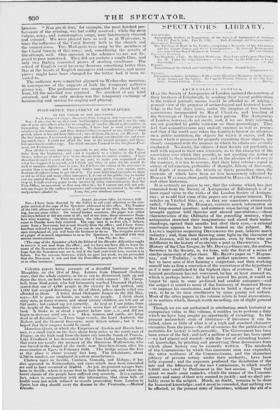Calcutta papers bring accounts of a dreadful hurricane on the
Hoogbley, on the 21st of May. Letters from Diamond Harbour Calcutta papers bring accounts of a dreadful hurricane on the Hoogbley, on the 21st of May. Letters from Diamond Harbour state, that the whole country, as far as can be discovered, both up and down the river, on both banks was strewed with corpses.% Mr. Camp- bell, from Mud-point, who had fortunately reached Diamond Harbour, stated that out of 4,000 people in the vicinity he had quitted, only 1,000 had escaped drowning, to die of thirst, unless speedy relief was afforded to them. A letter dated Shikapore Jaugor on the 22d May, says—All is gone, no bands, no tanks, no people. I think about sixty men, as many women, and about twenty children, arc left out of 930 souls ; but cannot say yet correctly. As near as I can judge, from the height of the bungalow, there were seven feet of water over the land. It broke in at about a quarter before nine A.M., and did not begin to decrease until one P.M. Men, women, and cattle, arc lying dead in all directions."—Three large vessels, the Lord Amherst, the Robert, and the General Gaseoyne, were driven ashore ; but it was hoped that their cargoes would be saved. Munchen-Gratz, at which the Emperors of Austria and Russia have met, is a small town on the Iser, about forty miles to the northeast of Prague, on the highroad from the latter city into the South of Prussia. Like Friedland, it has descended to the Clans-Gallas family-, and like that town too recalls the memory of the illustrious Wullenstein, who was buried in the chapel of the castle near Munchen-Gratz, after his assassination at Eger, in February 1634. The bridge across the Iser at this place is above seventy feet long. The inhabitants, about 2,700 in number, are employed in cotton manufactures. Cholera rages in Seville, Cordova, Granada, and Malaga; it has also appeared in Estremadura, and cases which have been concealed are said to have occurred at Madrid. As yet, its greatest ravages have been in Seville, where it seems first to have broken out, and where the lower classes of the people have suffered very severely. It is a curious fact, taken in conjunction with this information, that clean bills of health were last week refused to vessels proceeding from London to Spain, lest they should carry the disease to the Peninsula.—Medical Gazelle.




















 Previous page
Previous page